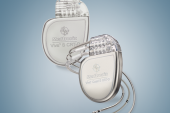FDA: Class I Recall of Cobalt and Crome ICDs and CRT-Ds Due to Reduced-Energy Shock
Patients with affected devices should be followed carefully and receive a software update that Medtronic has initiated.

(UPDATED) Over 87,000 Cobalt and Crome implantable cardioverter-defibrillators (ICDs) and cardiac resynchronization therapy defibrillators (CRT-Ds) manufactured by Medtronic are being recalled due to a risk that they may deliver less than the intended amount of electric shock energy. The US Food and Drug Administration has identified this as a Class I recall, the most serious type.
Medtronic has received 27 reports of devices issuing a short-circuit protection alert and delivering electric shocks to patients that are about 79% of the programmed energy. This reduced delivery of energy may result in failure to correct arrythmia, cause an irregular rhythm, or result in serious injury or death. According to the recall notice, however, no injuries or deaths have been associated with this issue. Medtronic first issued a notice to physicians about the problem in June 2022.
Patients who have these devices implanted should be remotely monitored following normal clinical protocol follow-up and encouraged to “attend their next scheduled follow-up in-clinic for device reprogramming (if necessary),” the recall notice specifies. According to a statement provided to TCTMD, Medtronic has received FDA approval and CE Mark for a software update to help mitigate this issue.
“The company began deploying the update into already implanted Cobalt XT, Cobalt, and Crome devices via in-clinic device checks in mid-August 2022,” the statement reads. “Newly manufactured devices will have the update preinstalled starting this month.” Additionally, Medtronic says that in the initial June 2022 communication they “instructed physicians to set these devices at maximum energy output (40 joules); by programming to maximum output, the impact on the devices’ effectiveness is minimal (eg, 99% efficacy to 98% efficacy) if the issue occurs.”
Other functions of the devices such as pacing, sensing, episode detection, anti-tachycardia pacing therapies, high voltage charging, battery life, and Bluetooth telemetry are not affected by the reduced-energy issue.
L.A. McKeown is a Senior Medical Journalist for TCTMD, the Section Editor of CV Team Forum, and Senior Medical…
Read Full BioSources
US Food and Drug Administration. Medtronic recalls Cobalt XT, Cobalt and Crome ICDs and CRT-Ds for risk that devices may issue a short circuit alert and deliver reduced energy shock during high voltage therapy. Published and Accessed on: August 19, 2022.





Comments